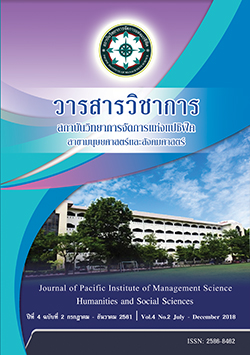Leadership, Innovative Management and Employee Engagement Effect to Efficiency of Information Technology Business in Thailand
Keywords:
Organizationleadership, Innovative Management, Employee Engagement Effect to Organization, Efficiency of Information Technology BusinessAbstract
The objectives of this research were to study: 1) level of leadership of organization, management innovation and commitment of employees to the organization affecting effectiveness of information technology business in Thailand, 2) relationship of leadership of organization, management innovation and commitment of employees to the organization affecting effectiveness of information technology business in Thailand. This research used the mixed method by using quantitative and qualitative research. In quantitative research, the sample group consisted of 412 employees and entrepreneurs in executive level in information technology business by simple random. The research tool was questionnaire. The data were analyzed by descriptive statistics and multiple regression analysis. In qualitative research, the research tool was in-depth interview. Research data were collected from ten employees in information technology business. The data were analyzed by using triangulation technique. As a result study, it was found that: 1) in the level of variables for study in structural equation model, management innovation had the highest value, at a high level. The lower levels were leadership of organization, and commitment of employees, respectively. 2) leadership of change had relationship with management innovation, commitment of employees to the organization, and effectiveness of information technology business with statistical significance at level of 0.05, and the relationship was positive. Management innovation had relationship with effectiveness of information technology business and commitment of employees to the organization had relationship with effectiveness of information technology business. However, management innovation did not have relationship with commitment of employees to the organization. The structural equation model corresponds to empirical information at acceptable level.
References
Bass, B. & Avolio, B. (1994), Improving Organizational Effectiveness through Transformational Leadership, Sage, Thousand Oaks, CA.
Bass, B. M. (1997). Does the transactonal-transformafional leadership paradigm transcend organizational and national boundaries? American Psychologist, 52(3), 130-139.
Bass. B. M & Ronald E. Riggio, (2006) Transformational leadership Copyright © 2006 byLawrence Erlbaum Associates, Inc.
Downloads
Published
Issue
Section
License
บทความที่ได้รับการตีพิมพ์เป็นลิขสิทธิ์ของ สถาบันวิทยาการจัดการแห่งแปซิฟิค
ข้อความที่ปรากฏในบทความแต่ละเรื่องในวารสารวิชาการเล่มนี้เป็นความคิดเห็นส่วนตัวของผู้เขียนแต่ละท่านไม่เกี่ยวข้องกับสถาบันวิทยาการจัดการแห่งแปซิฟิค และคณาจารย์ท่านอื่นๆในสถาบันฯ แต่อย่างใด ความรับผิดชอบองค์ประกอบทั้งหมดของบทความแต่ละเรื่องเป็นของผู้เขียนแต่ละท่าน หากมีความผิดพลาดใดๆ ผู้เขียนแต่ละท่านจะรับผิดชอบบทความของตนเองแต่ผู้เดียว







